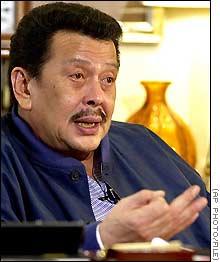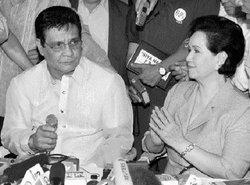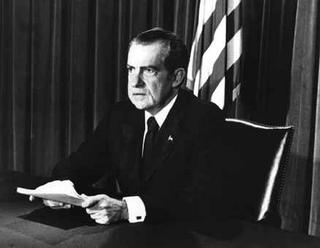in the coming months. This, in turn, could further dissipate the Arroyo administration’s energy hence weakening the president’s competence.
Thanks for visiting my blogspot. This is the place where you can know me as a minister, as a kuya (big brother), as an husband, as an academic and as a typical homo sapiens sapiens. I am the head pastor of the GENERATION 3:16 Ministries, a ministry devoted to the evangelism and discipleship of the younger generation. I also lead the LOVESTRUCK MOVEMENT, a ministry preaching Biblical purity and responsible dating, courtship, marriage and sexuality (www.lovestruckmovement.org).
Tuesday, July 26, 2005
Chacha and the Debate between Agency and Structure
in the coming months. This, in turn, could further dissipate the Arroyo administration’s energy hence weakening the president’s competence.
Monday, July 18, 2005
A Divided and Fragmented Nation
 The past few weeks saw the usual political brouhaha between the Arroyo administration and opposition parties. The admission of Arroyo that she was the one speaking with Commissioner Garcillano in the tapes was just an episode of an unpredictable political telenovela. Just like “Annaluna”, the drama series depicting the plight of an abused and martyr child, which I used to patronize during my elementary years, this political crisis has no definite ending. Annaluna’s long plot which spanned for five years irritated its avid viewers. It jumped from one TV station to another and went around circles. It followed the tradition of Voltes V series which often fails to broadcast the culminating episode. In the same vein the Gloriagate scandal is a deep, long tunnel, with no expected light at its end. It will continue to irritate its spectators and sow discomfort to the people.
The past few weeks saw the usual political brouhaha between the Arroyo administration and opposition parties. The admission of Arroyo that she was the one speaking with Commissioner Garcillano in the tapes was just an episode of an unpredictable political telenovela. Just like “Annaluna”, the drama series depicting the plight of an abused and martyr child, which I used to patronize during my elementary years, this political crisis has no definite ending. Annaluna’s long plot which spanned for five years irritated its avid viewers. It jumped from one TV station to another and went around circles. It followed the tradition of Voltes V series which often fails to broadcast the culminating episode. In the same vein the Gloriagate scandal is a deep, long tunnel, with no expected light at its end. It will continue to irritate its spectators and sow discomfort to the people.- Voluntary resignation of GMA
- Impeachment
- Truth Commission
- Snap Election
- Interim Caretaker government

Tuesday, July 05, 2005
Drawing Wisdom from Nixon's Resignation
----
Good evening.
This is the 37th time I have spoken to you from this office, where so many decisions have been made that shaped the history of this Nation. Each time I have done so to discuss with you some matter that I believe affected the national interest.
In all the decisions I have made in my public life, I have always tried to do what was best for the Nation. Throughout the long and difficult period of Watergate, I have felt it was my duty to persevere, to make every possible effort to complete the term of office to which you elected me.
In the past few days, however, it has become evident to me that I no longer have a strong enough political base in the Congress to justify continuing that effort. As long as there was such a base, I felt strongly that it was necessary to see the constitutional process through to its conclusion, that to do otherwise would be unfaithful to the spirit of that deliberately difficult process and a dangerously destabilizing precedent for the future.
But with the disappearance of that base, I now believe that the constitutional purpose has been served, and there is no longer a need for the process to be prolonged.
I would have preferred to carry through to the finish whatever the personal agony it would have involved, and my family unanimously urged me to do so. But the interests of the Nation must always come before any personal considerations.
From the discussions I have had with Congressional and other leaders, I have concluded that because of the Watergate matter I might not have the support of the Congress that I would consider necessary to back the very difficult decisions and carry out the duties of this office in the way the interests of the Nation would require.
I have never been a quitter. To leave office before my term is completed is abhorrent to every instinct in my body. But as President, I must put the interest of
To continue to fight through the months ahead for my personal vindication would almost totally absorb the time and attention of both the President and the Congress in a period when our entire focus should be on the great issues of peace abroad and prosperity without inflation at home.
Therefore, I shall resign the Presidency effective at
As I recall the high hopes for America with which we began this second term, I feel a great sadness that I will not be here in this office working on your behalf to achieve those hopes in the next 2 1/2 years. But in turning over direction of the Government to Vice President Ford, I know, as I told the Nation when I nominated him for that office 10 months ago, that the leadership of
In passing this office to the Vice President, I also do so with the profound sense of the weight of responsibility that will fall on his shoulders tomorrow and, therefore, of the understanding, the patience, the cooperation he will need from all Americans.
As he assumes that responsibility, he will deserve the help and the support of all of us. As we look to the future, the first essential is to begin healing the wounds of this Nation, to put the bitterness and divisions of the recent past behind us, and to rediscover those shared ideals that lie at the heart of our strength and unity as a great and as a free people.
By taking this action, I hope that I will have hastened the start of that process of healing which is so desperately needed in
I regret deeply any injuries that may have been done in the course of the events that led to this decision. I would say only that if some of my judgments were wrong, and some were wrong, they were made in what I believed at the time to be the best interest of the Nation.
To those who have stood with me during these past difficult months, to my family, my friends, to many others who joined in supporting my cause because they believed it was right, I will be eternally grateful for your support.
And to those who have not felt able to give me your support, let me say I leave with no bitterness toward those who have opposed me, because all of us, in the final analysis, have been concerned with the good of the country, however our judgments might differ.
So, let us all now join together in affirming that common commitment and in helping our new President succeed for the benefit of all Americans.
I shall leave this office with regret at not completing my term, but with gratitude for the privilege of serving as your President for the past 5 1/2 years. These years have been a momentous time in the history of our Nation and the world. They have been a time of achievement in which we can all be proud, achievements that represent the shared efforts of the Administration, the Congress, and the people.
(...)There is one cause above all to which I have been devoted and to which I shall always be devoted for as long as I live.
When I first took the oath of office as President 5 1/2 years ago, I made this sacred commitment, to "consecrate my office, my energies, and all the wisdom I can summon to the cause of peace among nations."
I have done my very best in all the days since to be true to that pledge. As a result of these efforts, I am confident that the world is a safer place today, not only for the people of America but for the people of all nations, and that all of our children have a better chance than before of living in peace rather than dying in war.
This, more than anything, is what I hoped to achieve when I sought the Presidency. This, more than anything, is what I hope will be my legacy to you, to our country, as I leave the Presidency.
To have served in this office is to have felt a very personal sense of kinship with each and every American. In leaving it, I do so with this prayer: May God's grace be with you in all the days ahead.
Sunday, July 03, 2005
People Power Fatigue or Middle Class Ignorance?
It must be noted that the middle class sector was the primary initiator of the two EDSA uprisings (note: they were not revolutions as the people were made to believe, but rather only a political change). Currently, this segment of Philippine society has yet to hear the “Gloriagate tapes” in full detail. The sector’s ambivalence toward the Gloriagate can be ascribed to its ignorance of the contents of the audio conversations. Many students and professionals are still clueless regarding the implications of the conversations between GMA and Garcillano. It is very difficult to believe on something you never experienced. If the people could only hear the exchange of words among First Gentleman Mike Arroyo, former senator Barbers and Garcillano, on how the three desired to sabotage the election results, they could also sense the outrage that leftist groups have been exhibiting since the emergence of the scandal.
A PACIFIST STATEMENT
I find the pastoral statement of Manila Archbishop Gaudencio Rosales instructive. For the Archbishop, five guidelines must be followed to peacefully resolve the current socio-political impasse.
First, “the offended cannot simply be consoled by expressions of regret. Forgiveness does not eliminate the need for justice, nor should it block the search for truth”.
Second, “the pursuit of truth regarding the grave charges against leaders and officials should be conducted within the provisions of our Constitution and should respect the laws of the land. Any proposition that disregards our constitutional and legal systems weakens our institutions and paves the way for a graver instability that can cause more profound suffering to our people.”
Third, “any proposed solution to our present situation that relies on or leads to violence is unacceptable.”
Fourth, “leaders must give people hope, by giving immediate attention to authentic reform.”
Finally, “in these confusing times when people are easily swayed by emotions and led astray by quick-fix solutions, may cooler heads prevail. Let true lovers of the Filipino people come together to discern carefully before God, what is truly for the immediate and long-run good of our country.”
It is my position that the public must listen and given access to to the audio recordings for them to appropriately discern the truth. The Philippine Center for Investigative Journalism has the audio files which can be downloaded from their blogspot http://www.pcij.org/blog. The president has admitted the wrongdoing. It means that she validated the truth behind the tape conversations. Even if the tapes were illegally acquired and recorded, the fact does not change---Mrs. Arroyo attempted to influence the results of the elections.
The truth will always set us free (John 8:32).
-
Maaaring ang artista’y sumuko at manahimik, upang mabuhay, ngunit ang ganya’y tiyak na kamatayan ng kaniyang sining. Nakikilala niyang bahag...
-
I am reposting this essay about a former janitor of UP-Diliman, Mang Mel. Lagi ko siyang nakikita sa AS (Arts and Sciences) Building noong...


